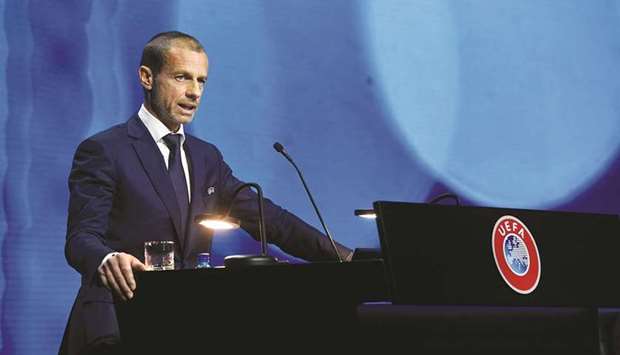UEFA president Aleksander Ceferin has warned rebel clubs that they will face “consequences” for their aborted breakaway and there may be more pain to come for the owners of the top clubs.
The failed attempt to create an elite Super League, as a direct rival to UEFA’s Champions League, has left Ceferin newly emboldened at the helm of Europe’s governing body.
The “Big Six” English Premier League teams abandoned the project on Tuesday leaving the Italian and Spanish teams, with the exception of Real Madrid, to accept the plan had failed.
“The doors of UEFA are open, and at the same time everyone will have to suffer the consequences for their actions,” Ceferin told Slovenian television station POP TV.
UEFA holds an executive committee meeting today.
“I expect a lot more to happen by Friday. Believe me, anyone who says he is completely calm in this situation is not telling the truth,” Ceferin said.
“I received SMS (text) support from practically all clubs in Europe. So now we expect everyone to realise their mistake and suffer the appropriate consequences,” he said.
While Ceferin did not elaborate on what price might be paid by the clubs, he did indicate that Real Madrid’s involvement in their Champions League semi-final with Chelsea was not likely to be impacted given complications for broadcasters.
“There is a relatively small chance that this match will not take place next week. But it will be a little different in the future,” he said.
UEFA’s lawyers are expected to offer options over response measures at today’s meeting and bans and suspensions could be justified under the organisation’s rule prohibiting unauthorised “combinations” or “alliances” of clubs.
“There will be some members who call for punishment but lawyers are more likely to be interested in protecting the organisation and tightening up the rulebook,” said one source close to UEFA.
However, Ceferin will be aware that clubs who have been punished for breaching Financial Fair Play regulations will take a dim view of other teams getting away with making a move which could have destroyed the lucrative Champions League.
REDISTRIBUTION MODEL
More broadly, there is also likely to be pressure for UEFA to rethink its Champions League reform plan for the post-2024 competition and the financial redistribution model.
“There is a likelihood that UEFA will look at these again, I think they may go backwards,” said one executive at a European sports broadcaster
“Instead of saying we’ll guarantee more money for the big old clubs, and more places for the big old clubs, I think they might go backwards and say actually we’re going to allocate more money in a fairer way and you’ve got to earn your place. There is a window to do that if they chose,” he said.
“(The 12) may find the deal that was offered to them from UEFA gets worse and their ability to do anything about that now has been significantly diminished, they can’t threaten to walk away again, that one has blown,” he added.
It could be a double-whammy on the European front — less money from UEFA and break-up fees for pulling the plug on their commitments to the Super League.
There will be consequences in English football as well.
As well as reports of the big clubs being pushed out of their positions on Premier League committees, the UK government, having played a key role in pressuring the Big Six to withdraw from the Super League, is to hold a review of the game.
British Prime Minister Boris Johnson has said the review, headed by ex-sports minister Tracey Crouch, “will do a root and branch investigation into the governance of football and what we can do to promote the role of fans in that governance”.
Amid a popular mood critical of the power of the top clubs, the desires of the billionaire foreign owners are not likely to be high among Crouch’s priorities.
Culture secretary Oliver Dowden has said the German model, which empowers fans by limiting investors to a 49% stake, will be looked at.
The Super League breakaway may have only lasted 48 hours but it may prove to have been a very expensive mistake.

UEFA President Aleksander Ceferin addresses the 45th Ordinary UEFA Congress in Montreux, Switzerland, on Tuesday. (Reuters)
